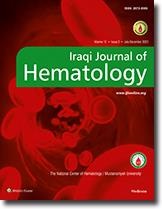Abstract
Abstract:
BACKGROUND: Chronic myeloid leukemia (CML) is one of the indolent myeloproliferative neoplasms.
It is characterized by the presence of the Philadelphia chromosome, a translocation between
chromosomes 9 and 22 or BCR‑ABL1 gene.
OBJECTIVES: The aims of this study were to evaluate characteristics of CML patients and their
molecular response to tyrosine kinase inhibitors (TKI) in Erbil city in Iraq.
PATIENTS AND METHODS: Seventy‑six patients with CML were recruited in this retrospective and
prospective study from February 2014 to March 2016, at Nanakaly Hospital for Blood Diseases in Erbil
city – Kurdistan region of Iraq. They were evaluated from clinical point of view and their laboratory
data, and molecular responses to TKI based on polymerase chain reaction were analyzed.
RESULTS: The median age of participants was 45 years; the male: female ratio was 1:0.9. The main
presenting features were abdominal fullness in 66% and splenomegaly in 95% of patients. Nearly 66%
of them had low European Treatment and Outcome Study (EUTOS) score; 70% of patient had major
or complete molecular responses (MMR/CMR). There was a significant difference between patients
who did versus who did not achieve MMR/CMR in hemoglobin level, promyelocyte, and myelocyte
percent, EUTOS, and Sokal scores (P = 0.02, 0.006, 0.03, 0.001, and 0.02, respectively).
CONCLUSION: In the current study, CML patients were at a younger age of onset, and more high
EUTOS score. The majority of patients achieved MMR with frontline Imatinib or Nilotinib and those
who switched from Imatinib to Nilotinib as well.
BACKGROUND: Chronic myeloid leukemia (CML) is one of the indolent myeloproliferative neoplasms.
It is characterized by the presence of the Philadelphia chromosome, a translocation between
chromosomes 9 and 22 or BCR‑ABL1 gene.
OBJECTIVES: The aims of this study were to evaluate characteristics of CML patients and their
molecular response to tyrosine kinase inhibitors (TKI) in Erbil city in Iraq.
PATIENTS AND METHODS: Seventy‑six patients with CML were recruited in this retrospective and
prospective study from February 2014 to March 2016, at Nanakaly Hospital for Blood Diseases in Erbil
city – Kurdistan region of Iraq. They were evaluated from clinical point of view and their laboratory
data, and molecular responses to TKI based on polymerase chain reaction were analyzed.
RESULTS: The median age of participants was 45 years; the male: female ratio was 1:0.9. The main
presenting features were abdominal fullness in 66% and splenomegaly in 95% of patients. Nearly 66%
of them had low European Treatment and Outcome Study (EUTOS) score; 70% of patient had major
or complete molecular responses (MMR/CMR). There was a significant difference between patients
who did versus who did not achieve MMR/CMR in hemoglobin level, promyelocyte, and myelocyte
percent, EUTOS, and Sokal scores (P = 0.02, 0.006, 0.03, 0.001, and 0.02, respectively).
CONCLUSION: In the current study, CML patients were at a younger age of onset, and more high
EUTOS score. The majority of patients achieved MMR with frontline Imatinib or Nilotinib and those
who switched from Imatinib to Nilotinib as well.
Keywords
Chronic Myeloid Leukemia
Erbil
molecular responses
